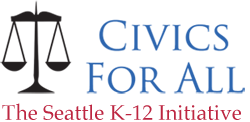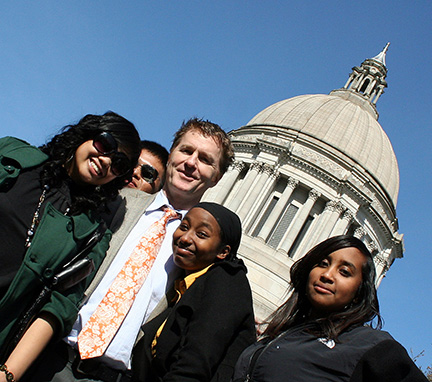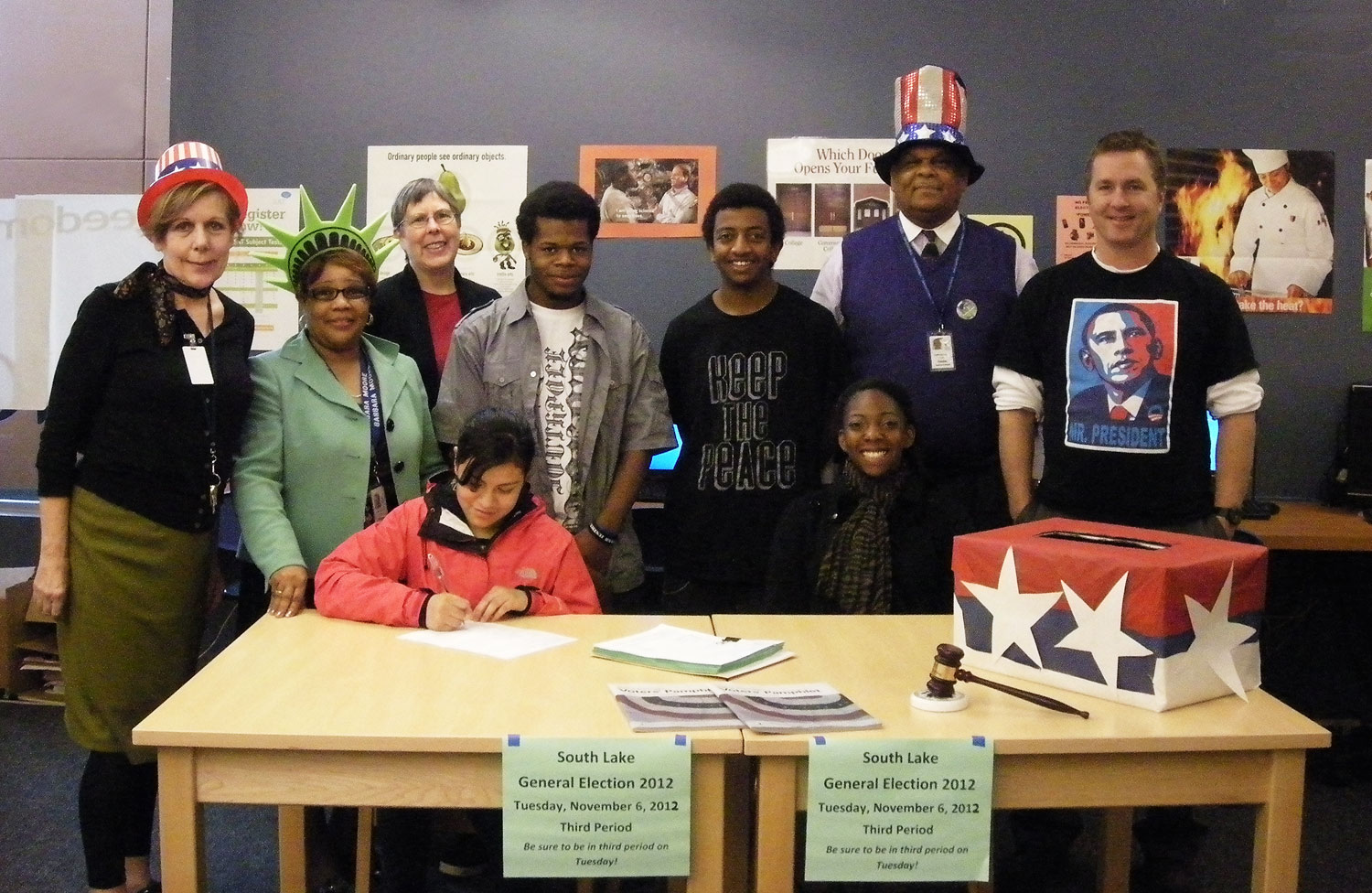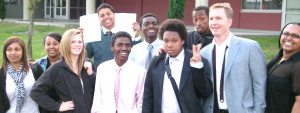VISION – Read All
“Civic education is, therefore, political education.”
The vision of Civics for All:
- For students: all Seattle K-12 students will become experts in democratic citizenship.
- For schools: all schools will become hotbeds of civic knowledge, awareness, and engagement.
- For the city: Seattle’s civic culture (govt., NGOs, non-profits, for-profits, etc.) will spark with adolescent enthusiasm, energy, and idealism.
- For the district: Civics for All will engage and empower all employees by intentionally building the culture of the Seattle Public Schools into a “Civic Culture” where all adults study, discuss, and celebrate the fundamental principles of democracy with youth.
- For the state and nation: Seattle and the Seattle Public Schools will become the civics education model for the state and the country.
Core philosophy of Civics for All:
If we are concerned that a great many of our students graduate without knowing a wit about democracy, we adults need to recognize that it is our fault, not theirs. We have allowed the marginalization of citizenship education in the name of skills focused lessons to prepare kids for standardized tests. That is a simple fact and an uncomfortable truth that we must address and act upon if we as a city want to reassert the primacy of civics and democratic citizenship in our children’s lives.
Cultivating an authentic, scholarly commitment to citizenship is not only a K-12 endeavor, it is a lifelong process. It depends upon the formation of the child’s sense of self-respect and unique belief system. The cultivation of each child’s largely pre-existent civic, ethical, and political beliefs creates the foundation from which the child sincerely chooses to embrace his civic duty to interact with and support the needs of other citizens and of the Common Good. When our children’s civic identities are kindled they gain a sense of agency and hope that many of them lack. The cognitive growth that accompanies this development is paralleled by increased academic achievement.
The “civics deficit” among many of our at-risk students and struggling learners is shocking, yet a high percentage of all of our students struggle to articulate even the most basic understanding of the fundamentals of civics, politics, and government. It is a crisis, as Justice Sandra Day O”Connor O’Connor said last year. The deficit can be erased but it will take an “all-hands on deck” approach where all teachers in every discipline and in every school integrate democratic and civic principles into their lessons and unit plans.
When students and staff all share a K-12 vertically integrated set of core principles, essential questions, and common instructional language the entire school benefits from the clear structure.
When teachers and schools come together to provide meaningful, relevant, and well organized civics lessons and activities our students invariably and joyfully rally to the call of citizenship and the defense of the Common Good. Like many other teachers, I have seen civics based lessons inspire students, especially marginalized and at-risk scholars, to study harder, learn more, and get better grades. Indeed, it is fair to say that the affective power of civic learning and engagement is often transformative and can propel kids towards profound personal growth and dramatic increases in self-esteem and academic achievement.
“If there be time to expose through discussion the falsehood and fallacies, to avert the evil by the processes of education, the remedy to be applied is more speech, not enforced silence.”
— Supreme Court Justice, Louis D. Brandeis,
Whitney v. California, 1927
Objectives of Civics for All:
- To hyper-boost Seattle School District K-12 students’ academic achievement, civic knowledge, and engagement by motivating and empowering students with lessons in all academic disciplines that are presented in timeless civic/ethical/political frameworks.
- To have the absolute broadest base of buy-in to the initiative that is possible – teachers, administrators in the schools and downtown, parents, NGOs and CBOs, politicians locally/city/state, the business community, and students!!!
- To encourage, empower, and support all non-social studies teachers to see that “civics across the curriculum” is just as essential as “math across the curriculum” or “reading and writing across the curriculum” are.
- To provide great resources for teachers and students interested in civics and leadership, like UVA’s Youth Leadership Initiative.
- These resources will include ready to use electronic lesson plans for each discipline at each grade level that will be on the district’s Fusion page in the Civics for All folder.
- To create a “Civic Culture of Learning” in our schools where teachers and all personnel lead the joint effort to study, discuss, and enact educational and institutional policies that celebrate timeless civic norms like justice, civility, truth, engagement, and virtue.
- To very intentionally implement a school-wide shift to a “culture of civic virtue,” via language, posters, rituals, routines, to improve school wide civility, civic norms, heightened participation in extra-curriculars, connections to outside class civics activities, etc.
- To get students excited about deepening and extending their own personal set of core values, beliefs, and principles about the great issues of justice, ethics, and morality.
- To keep it real – to help kids honestly and authentically develop their unique civic identities and to apply their personal principles and beliefs about civic duty and government in solving social and political problems locally, nationally, and internationally.
- To facilitate district wide mock elections and student voter registration drives.
Longer-term goals and possibilities for Civics for All:
District level
- Add new course requirement: semester long “Civics and Contemporary Problems” course in addition to current semester of required “American Government” for seniors – or merge the two and into a year long course titled “American Government and Civics” or similar.
- Add new course elective: “Media Literacy for Citizens”.
- Explore revision of 9th and 10th grade social studies expectations, perhaps adding a required “Freshman Civics” course for first semester freshmen.
- Add Public Service and Political Science Academies (PSA), similar to Franklin High’s old PSA, at every high school, and perhaps middle schools.
- Add required legislative service learning projects like Franklin’s “Olympia Project” and former “D.C. Project” at all high schools.
- Add the word “politics” to SSD website: the Social Studies department supports learning about the world in the contexts of History, Economics, Geography, and Civics.
State and federal levels
- New and expanded state civics education requirements. The Washington State Legislature deserves praise for adding a required semester of government/civics for those districts that did not already have that requirement. They should now consider passing more civics education requirements – a 9th grade SS Civics class would be a great one to consider.
- Congressional resolution directing states to explore stiffer state civics requirements, similar to former Associate Justice Sandra Day O’Connor’s recent civics education bill in the House (2011).
« Goals







